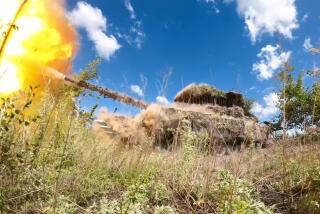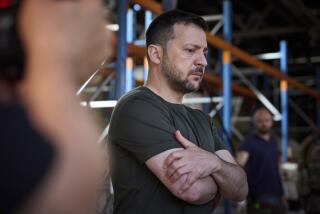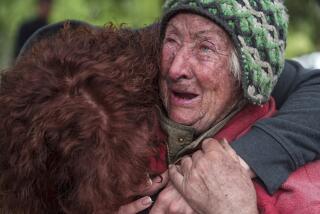As Ukraine separatists prepare to vote, world awaits Kremlin response
Pro-Russia gunmen occupying Ukrainian government buildings in the volatile eastern regions of Donetsk and Luhansk have summoned the local populations to vote Sunday on whether to seek “autonomy” from the government in Kiev, a divisive referendum from which even the separatists’ Kremlin backers have distanced themselves.
Unlike in Crimea, the Ukrainian Black Sea peninsula seized and annexed by Russia earlier this year, Russians comprise a minority in the rest of Ukraine, where recent polling results show a solid majority even in the eastern areas against secession and alignment with Russia.
Still, violent confrontations in recent days between separatists and Ukrainian police and military forces have heightened tensions and possibly bolstered the militants’ message that the interim government in Kiev poses a threat to the rights and security of the Russian minority.
On Friday, when the Allied Forces’ victory over Nazi Germany in World War II was celebrated across Eastern Europe, Ukrainian troops deployed by Kiev on an “anti-terrorist operation” clashed with pro-Russia forces occupying the police headquarters in Mariupol, a port on the Sea of Azov along the main road from Russia to Crimea. Mariupol is part of the Donetsk region and its residents are among those called to vote Sunday on their future status within Ukraine.
At least seven deaths were reported in conflicting accounts of the fighting. Local supporters of the separatists accused the government troops of firing on the militants in an attempt to oust them, while locals loyal to the Kiev leadership and a unified Ukraine described the violence as provoked by the pro-Russia gunmen.
Reports in Kremlin-controlled Russian media describe the militants as “protesters” demanding a national dialogue aimed at transforming Ukraine into a loose federation in which regions would determine their own economic and foreign policies. That would allow the Russian-speaking areas with traditional ties to Moscow to opt out of the central government’s plan to bolster trade and relations with the European Union, a shift in political alliance that the Kremlin opposes.
Whether Sunday’s referendum proves more than an unrecognized and unmeasurable expression of the separatists’ desire to align with Russia depends much on Russian President Vladimir Putin. The Kremlin leader is accused by Kiev authorities and their Western allies of fomenting the unrest in the east to destabilize Ukraine and put in doubt the legitimacy of its May 25 presidential election.
Putin called on the separatists last week to postpone the referendum, conceding to a request by the Organization for Security and Cooperation in Europe for more time to work out a diplomatic solution to the conflict over eastern Ukraine’s future.
The self-proclaimed leader of the “People’s Republic of Donetsk,” Denis Pushilin, rejected Putin’s advice, claiming local advocates of separation from Kiev have demanded the opportunity to vote on their region’s future now.
Putin may have signaled the limits of his support for the separatists with his spurned request for delay of the referendum. Kremlin instigation of a similar vote in Crimea in mid-March and its widely condemned annexation of the peninsula led to the United States and European Union imposing sanctions on Russian officials and Kremlin-allied businesses. Though limited, the sanctions and the threat of more to come have scared away foreign investors and caused double-digit percentage drops in the value of Russian stocks and the ruble.
Putin showed little sign of backing down from his defiant posture as defender of Russian people and interests in neighboring countries during Victory Day displays of Russian firepower on Friday, including his first visit to Crimea since the territory was annexed to Russia on March 18. But the Kremlin leader has said little about the Donetsk and Luhansk referendum since his unsuccessful call for its delay, leaving him seemingly unobliged to recognize its result or to respond to any appeal for Crimea-like annexation.
There will be no international monitoring of the referendum Sunday, which will likely leave the legitimacy of the vote count open to criticism and speculation of fraud. Recent opinion surveys across Ukraine by the Donetsk-based Institute for Social Research and the Washington-based Pew Research Center and International Republican Institute all showed a large majority of those in the east and south favoring a unified Ukraine.
In the Donetsk survey, only 16% of locals questioned said they supported the armed occupation of government buildings. A Gallup poll conducted for IRI found just 4% in favor of breaking away from Ukraine to join Russia.
Efforts to distance the Kremlin from the uphill political battle of the Ukrainian separatists may also have been signaled by a rhetorical sea change in Russian state-controlled media in recent days. Influential news services like Itar-Tass that have consistently labeled acting Ukrainian President Oleksandr Turchynov and Prime Minister Arseny Yatsenyuk as nationalists, illegitimate and “coup-installed” suddenly changed their descriptions of the interim leaders on Thursday to “parliament-appointed.”
Turchynov and Yatsenyuk were named to run the country in late February, when the elected president and Kremlin ally, Viktor Yanukovich, fled the country after being toppled by a pro-Europe rebellion. Yanukovich’s Party of Regions had controlled the national parliament but many of the deputies defected to the opposition during the three-month revolt or fled the capital after he did. The Kremlin has consistently referred to the rump parliament’s appointments of interim leaders as the results of a coup d’etat.
Whatever the reported outcome of the referendum, Putin is under little pressure to act on the results, having expressed his desire for postponement. And should majority support for independence from Kiev be expressed, or at least reported by the organizers, the vote could fuel further challenges to the Ukrainian interim government’s authority in broader areas of the south and east, validating the Kremlin line that Russians in Ukraine are fearful of their future.
The Obama administration and European leaders have warned Moscow and the separatists against any attempts to undermine the May 25 presidential vote, which Kiev authorities hope will resolve lingering questions about their legitimacy.
But if Donetsk, Luhansk and other divided areas of Ukraine defy the national presidential polling with separatist ballots of their own, the Kremlin and its Ukrainian supporters can cast doubt on the reliability of the May 25 election that, like their referendum, fails to measure the will of all Ukrainian voters.
More to Read
Sign up for Essential California
The most important California stories and recommendations in your inbox every morning.
You may occasionally receive promotional content from the Los Angeles Times.











